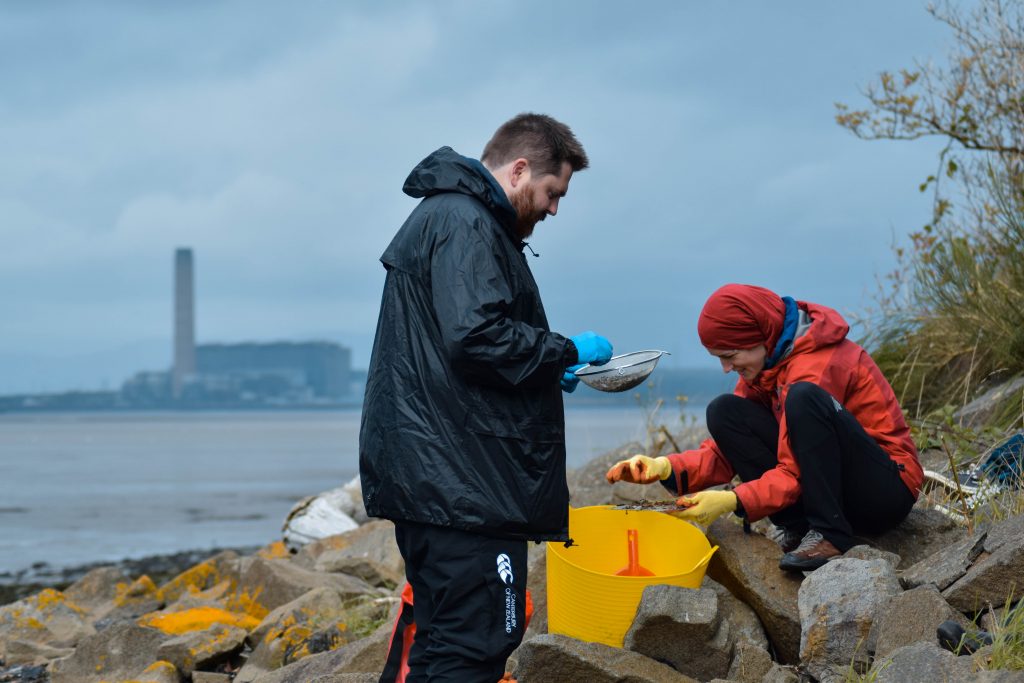Nurdles
pre-production plastics
How do we tackle pellet pollution? A global perspective
We have come a long way since we started The Great Nurdle Hunt. Pellet pollution is now recognized as a real issue not just in Scotland, but internationally. We have also discovered that we are not working alone, making contact with many organizations across the globe who are committed to tackling pellet pollution and who are using a variety of approaches to influence change.
This page summarizes existing solutions approaches we have come across with some thoughts on the opportunities and challenges of each idea, from Fidra’s perspective.
Our aim is to:
- Celebrate and showcase the multitude of tactics used by organisations internationally
- Inspire and inform those looking to start work on this topic
- Highlight potential synergies to maximise the effectiveness of global pellet pollution solutions
The basics
The basic premise is the same almost everywhere: We need to stop pellet pollution at source, across the full plastics industry. This requires not only increased awareness, but a culture shift across companies handling pellets. Achieving this may require different approaches according to what works in each region of the world, but at the same time, the complexity and international nature of plastics supply chains means solutions should be compatible and complementary.
We want to share knowledge and information across this growing global nurdle network of organisations, all working in parallel to achieve the best possible solutions to this pervasive pollution problem.


The bigger picture
The vast size of the plastics industry makes tackling nurdle pollution an incredibly difficult challenge, and the rapid growth of production year-on-year makes it even harder to control the tiny trickles of pellets from each site, adding up to huge global emissions. This familiar story highlights how closely the problems of plastic pollution are linked with others tied with our ongoing consumption of fossil fuels, the climate and biodiversity crises. We fully agree with scientists calling on these problems to be tackled in parallel, rather than seeing them as issues competing for political space.
However, even if we phase out fossil fuels and plastic or create a fully functioning circular economy, we are likely to be producing and transporting nurdles in complex supply chains for a long time to come. Similarly, a ban on nurdles and a change of how plastic is produced and transported internationally is not currently feasible. Therefore, from Fidra’s pragmatic vantage point, we see nurdles as something we need to live with, and manage effectively in a way that does not create unnecessary pollution.
Standards and Certification Schemes
Standards set minimum requirements for best practice. External audits allow companies to prove that they handle pellets responsibly. A public register of certified companies allows others to buy products from those that handle them responsibly.
Opportunities
This can build on existing voluntary approaches and gets industry buy-in because these systems are already used on many industrial sites for health, safety and environmental management. This is a way to reach almost all parts of the supply chain.
Challenges
A scheme like this is only ever as good as the standard that underpins it. A vague minimum standard, and poorly managed certification scheme will not bring about the needed change, and limited transparency could lead to greenwashing. Voluntary schemes won’t reach all companies– further levers will be needed to reach the worst offenders.
Find out more
Legislated Supply Chain Accreditation
Companies could be required by law to prove good practice through standards and certification schemes. Brands and retailers putting plastic products on the market could be required to prove that they have been produced in certified supply chains.
Opportunities
Legislation makes a level playing field for industry, reaching all companies. Using certification as a tool for legislation improves industry buy-in and focuses on prevention. It doesn’t rely on spotting or tracing back pollution incidents.
Challenges
There is currently no working example of a scheme for pellets that legislation can be based on, making policymakers hesitate. Again, this system is only ever as good as the standard and certification scheme it is based on – it needs to be well-designed from the outset.
Find out more
Harnessing Shareholder and Investor Pressure
A range of routes have been taken to harness investor pressure as a route to change.
This might focus around improving transparency, or push for implementation of other solutions mentioned here.
Opportunities
Investors have powerful influence on companies, and their reach can be international.
Challenges
This kind of work usually targets specific, larger companies, so many smaller companies might still go under the radar.
Find out more
Labelling and Reporting
The EU might soon bring in laws requiring companies handling pellets to report annual emissions and sell pellets with instructions for use and disposal. NGOs (including Fidra) have called for strengthened requirements, e.g. using hazard labels on packaging.
Opportunities
This will raise awareness, with information reaching all parts of the plastic supply chain. Reporting can be complementary to other regulatory action to make sure the effectiveness of other solutions can be tracked and measured.
Challenges
With no standardised method for reporting, and limited data, there are concerns that industry are able to define their own reporting requirements, which may allow pellet pollution to continue under the radar.
Reporting and monitoring alone will never stop pellet pollution, more action is required.
Find out more
Designating Pellets as Hazardous Goods
To reduce the chance of major pellet spills at sea, pellets and other microplastics could be designated as hazardous under international maritime law. This would automatically lead to certain requirements for how the material is shipped and put in place clear emergency procedures in the case of a spill. Recent precedent has been set by Canada legally designating plastic as toxic material.
Opportunities
This could have an immediate impact for the most direct route for marine pellet pollution and will
sets a precedent for other parts of the supply chain and wider plastic pollution action.
Challenges
While shipping disasters can be highly damaging locally, estimates suggest most losses of pellets occur on land.
Any action at sea shouldn’t distract from solving the pellet pollution problem across the full supply chain.
Find out more
Litigation Using Existing Laws
Many countries already have laws around waste or littering that cover pellet pollution incidents. Communities and NGOs have successfully mounted legal cases against companies found to be breaking these laws through chronic pellet pollution.
Opportunities
The high profile of individual cases puts pressure on the wider industry to make change.
Money raised by litigation can also be used for campaigns to raise the profile of pellet pollution. Companies are often required to clean up polluted sites.
Challenges
It is hard to prove exactly where pellets came from once in the environment. Some cases have required evidence from years of monitoring. While existing laws might catch some of the worst offenders, small-scale, chronic leaks are unlikely to be tackled, which still add up to an enormous pollution problem.
Find out more
Storm Water Permits and Thresholds
Legislation in parts of the US (e.g. California) has specified pellets in storm water permits. This means public inspectors can take immediate action if they see pellets escaping or poor practice. Inspectors can also provide advice to companies to improve pellet containment.
Opportunities
Many companies already have storm water permits and inspections, so it is straightforward to add specific mention of pellets.
Challenges
Unless set at zero, any threshold suggests there is an acceptable level of pellet loss to the environment, sending the wrong message to companies. Permits will not stop pellet pollution during transport, off-site. This approach puts pressure on public authorities to carry out checks.
Find out more
A Global Plastics Agreement?
An ongoing challenge for any solution to pellet pollution is how to ensure global co-ordination and compatibility across globally complex supply chains. With increasing calls for a global multinational ‘plastics agreement’ the problem of pellet pollution is an item that should be on its agenda.
Opportunities
This could provide a unique platform discuss the implementation of the solutions outlined above in the most effective way to stop pellet loss. It could allow for global uptake of working solutions developed in one region.
Challenges
Getting support for adding pellet action to a global agreement may be difficult while there are few/no regional working examples of legislation.
Find out more
Documenting impacts of pollution
Ongoing work to highlight the impact of pellet pollution on communities and ecosystems internationally continues to be vital to support all this solutions work.
Partnerships between organisations have brought community action to a broader audience, making sure voices of those impacted at a local level are heard by industry and decision-makers.
Below are just a few examples of how groups are working to raise awareness of nurdle pollution on their beaches.
Find out More
What else?
Have you been working on anything that isn’t mentioned here? Do you think we are missing a vital route for change?
Get in touch to let us know.
